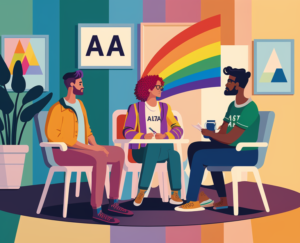In today’s society, diversity and inclusivity are celebrated, allowing individuals to express their true selves freely. Gay relationships, like any other romantic relationship, require effort, understanding, and effective communication. Navigating through challenges unique to the LGBTQ+ community, gay couples can build strong foundations, nurture intimacy, overcome obstacles, and maintain a healthy and fulfilling partnership. In this article, we will provide valuable gay relationship advice and insights for individuals seeking guidance.
Contents
About Gay Relationship

Gay relationships refer to romantic and/or sexual relationships between individuals of the same gender. These relationships are based on love, attraction, and emotional connections, just like any other relationship. Gay relationships are an integral part of the diverse spectrum of human sexual orientation and have existed throughout history and across cultures.
It’s important to note that gay relationships should be understood and respected in the same way as any other relationship. The rights and recognition of gay relationships vary across different countries and regions. In many places, laws and societal attitudes have evolved to provide legal protections and recognition to same-sex couples, including the right to marry or enter into civil partnerships.
Just like any other relationship, the success of a gay relationship depends on the individuals involved and their ability to communicate, trust, and support each other. Open and honest communication, mutual respect, shared values, and a strong emotional connection are crucial factors for a healthy and fulfilling gay relationship, as they are for any relationship.
Challenges in Gay Relationships
Gay relationships can face various challenges, many of which stem from societal attitudes and prejudices. Here are some common challenges that individuals in gay relationships may encounter:
- Homophobia and Discrimination: Homophobia refers to negative attitudes, prejudice, or discrimination against individuals based on their sexual orientation. Gay couples may face societal prejudice, discrimination, or even violence, which can impact their relationship and well-being.
- Legal and Social Recognition: In some jurisdictions, gay relationships may not receive the same legal recognition and protections as heterosexual relationships. This lack of legal recognition can create challenges in areas such as adoption, healthcare decision-making, inheritance rights, and more.
- Family and Social Acceptance: Coming out to family and friends can be a significant challenge for individuals in gay relationships. Not all families and social circles are accepting or supportive, which can strain relationships and cause emotional stress.
- Internalized Homophobia: Some individuals in gay relationships may struggle with internalized homophobia, which is the internalization of negative societal attitudes towards homosexuality. This can lead to self-doubt, shame, or difficulty fully accepting and embracing one’s own identity, affecting the dynamics of the relationship.
- Relationship Disclosure: Deciding when and how to disclose one’s relationship can be a complex process. Fear of rejection, judgment, or negative consequences can create stress and strain within the relationship.
- Navigating Gender Roles: Traditional gender roles and expectations may not align with same-sex relationships, leading to unique challenges in defining roles, responsibilities, and power dynamics within the relationship.
- Lack of Representation: Limited representation of gay relationships in media, literature, and popular culture can impact the visibility and understanding of these relationships. This can make it challenging for individuals in gay relationships to find relatable role models or seek guidance.
Gay Relationship Advice

These are the 10 pieces of advice for maintaining healthy gay relationships:
Building Strong Foundations
Building a strong foundation is essential for any relationship, including gay relationships. Here are some key aspects to focus on when establishing a strong foundation:
- Mutual Respect: Treat your partner with respect, kindness, and consideration. Value their opinions, boundaries, and individuality. Respect forms the basis of a healthy and thriving relationship.
- Trust and Honesty: Trust is crucial. Be honest with your partner and cultivate a sense of trust through open communication and transparency. Avoid keeping secrets or withholding important information.
- Effective Communication: Develop effective communication skills. Listen actively, express yourself clearly and honestly, and be open to understanding your partner’s perspective. Communicate your needs, desires, and concerns in a non-judgmental and constructive manner.
- Shared Values and Goals: Establish shared values and goals as a couple. Discuss your expectations, ambitions, and visions for the future. Find common ground and work together towards those shared goals.
- Emotional Support: Offer emotional support to your partner during both good times and challenging moments. Be there for them, provide comfort, and offer a safe space for vulnerability and expression of emotions.
Nurturing Intimacy
Nurturing intimacy is crucial for deepening emotional connection and maintaining a fulfilling and satisfying gay relationship. Here are some ways to nurture intimacy:
- Emotional Availability: Create a safe and non-judgmental space for your partner to express their emotions. Be attentive and empathetic when they share their thoughts, feelings, and experiences. Validate their emotions and provide support and understanding.
- Active Listening: Practice active listening to truly understand your partner. Pay attention to their words, body language, and emotions. Reflect on what they have expressed to ensure accurate understanding. Avoid interrupting or dismissing their feelings.
- Quality Time Together: Dedicate uninterrupted time to be fully present with your partner. Engage in activities you both enjoy and create opportunities for shared experiences. This can be as simple as cooking together, taking walks, or planning regular date nights.
- Physical Intimacy: Physical affection plays a significant role in nurturing intimacy. Engage in acts of affection, such as hugging, kissing, holding hands, and cuddling. Intimacy can also involve sexual expression, which should be consensual and based on open communication and mutual desires.
Overcoming Challenges

Overcoming challenges is an important aspect of maintaining a strong and resilient gay relationship. Here are some strategies to help you navigate and overcome challenges:
- Open Communication: Foster open and honest communication with your partner. Discuss challenges openly, express your concerns, and actively listen to each other. Avoid making assumptions and strive to understand each other’s perspectives.
- Seek Support: Reach out for support when facing challenges. Seek guidance from trusted friends, family members, or professionals, such as therapists or counselors who specialize in LGBTQ+ issues. Join support groups or LGBTQ+ communities where you can connect with others who have faced similar challenges.
- Educate Yourself: Knowledge is empowering. Educate yourself about the specific challenges faced by LGBTQ+ individuals and relationships. Understand legal rights, resources, and available support networks. This can help you navigate challenges more effectively.
- Build Resilience: Cultivate resilience as individuals and as a couple. Recognize that challenges are a part of life, and it’s how you respond to them that matters. Focus on your strengths, develop coping strategies, and support each other in building resilience.
- Practice Self-Care: Take care of yourself and encourage your partner to do the same. Engage in activities that promote physical, mental, and emotional well-being. Prioritize self-care routines that help you recharge and maintain a positive mindset.
- Address Internalized Homophobia: Internalized homophobia can be a challenge in gay relationships. Recognize and address any negative beliefs or self-doubt that may arise. Challenge societal stigma by embracing your identity and seeking support to overcome internalized homophobia.
Maintaining a Healthy Relationship

Maintaining a healthy relationship requires ongoing effort, dedication, and a mutual commitment to the well-being of both partners. Here are some essential tips for maintaining a healthy gay relationship:
- Trust and Honesty: Trust is essential in any relationship. Be trustworthy and honest with your partner, and foster an environment of trust where both of you feel safe and secure. Avoid keeping secrets or engaging in deceitful behavior.
- Quality Time Together: Make time for each other and prioritize quality time. Engage in activities you both enjoy and create opportunities for shared experiences. This helps strengthen your bond and maintain a sense of connection.
- Respect and Equality: Treat each other with respect, kindness, and equality. Value each other’s opinions, boundaries, and individuality. Avoid belittling behavior and strive for a relationship built on mutual respect.
- Emotional Support: Be there for each other emotionally. Provide support, comfort, and understanding during both good times and challenging moments. Show empathy and validate each other’s feelings and experiences.
- Shared Responsibilities: Share responsibilities and decision-making within the relationship. Distribute tasks and chores fairly, and collaborate on important decisions. This fosters a sense of teamwork and equality.
- Intimacy and Affection: Maintain a healthy level of physical and emotional intimacy. Express affection, both verbally and physically, to nurture your connection. Continually explore each other’s needs and desires, and ensure that both partners feel satisfied and fulfilled.
- Personal Growth and Independence: Encourage each other’s personal growth and maintain individual identities and interests. Support each other’s aspirations and give each other space to pursue personal goals and hobbies. This helps foster a healthy balance between togetherness and individuality.
Conclusion
In conclusion, gay relationships are built on love, respect, and mutual support, just like any other relationship. They face unique challenges stemming from societal attitudes and prejudices, but with understanding, open communication, and a commitment to growth, these challenges can be overcome.
Remember, each gay relationship is unique, and it’s important to adapt these guidelines to your specific circumstances and individual needs. By fostering a loving, respectful, and supportive partnership, you can create a fulfilling and lasting bond. Love knows no boundaries, and everyone deserves a relationship where they can find happiness and acceptance with gay relationship advice.
Life may sometimes be challenging if you are gay, but Online Gay Counseling can help. Get experienced LGBTQ therapists at PrideMantra: Book a trial LGBTQ therapy session.


